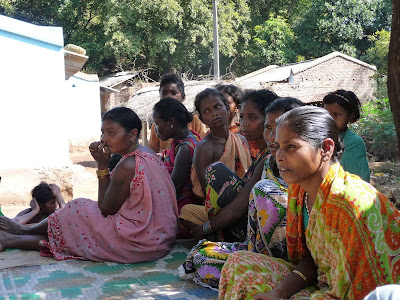Gina writes:
Last Saturday, Corey and I finally had the chance to go out to the field. We hadn't yet been able to see SOVA's work at the village-level and we had a visitor from VSO UK with us for the day, so we took the opportunity to ask the director if a trip could be arranged.
On Saturday morning, we went with the program manager for SOVA's livelihood programs to visit Nua Kerenga, a village of 47 households about 5 miles outside of Koraput. Nua Kerenga is a displaced village, meaning that they were living on the riverbank for generations, but had to move in the mid-80's when a hydro-electric dam was built and their village was flooded out. The average monthly income for a family of 3 to 4 is Rs. 625, or about $13.50. The primary source of income for villagers is manual labor in the form of breaking stones into construction-grade materials and the seasonal sale of agricultural products, primarily rice, in nearby markets. The sale of plates made out of leaves supplements family income when time for fabricating permits. Very few adults in the village are literate.

A representative view of the house construction and poverty.
Since there is one road in the village and only 47 households, we didn't need a formal tour. We took a brief look at the school and then just walked around and tried unsuccessfully not to scare the kids with our whiteness. We took a few pictures and then sat on mats with some of the women and children to talk about some of the projects that SOVA is working on.

We're ready for the meeting!
Solar lights - SOVA works with a U.S. non-profit called Beyond Solar to provide solar lights to villages throughout Koraput. Beyond Solar "sells" the lights to the villagers, but instead of collecting the payments, the money goes to a community development fund. With use of the solar lantern, villagers are able to perform domestic activities, such as food preparation and home maintenance, after sunset. This extends their work day and increases earning potential. The villagers also report many qualitative benefits: the solar lights are safer than the kerosene lanterns; children are able to study at night; they can see the insects in their food during meal preparation and consumption. The village leaders hold community meetings at night and noted the lantern’s potential during village festivals, when villages typically spend thousands of rupees on kerosene.

A house with the solar lights collecting energy.
Grain bank - A major problem in rural India is debt. Banks will not make loans to poor people, so they become indebted to exploitative landlords and private moneylenders. The grain bank helps farmers to cope with the lean periods when they have no food to eat and are forced to borrow money. The village storehouse of rice and other grains Village Development Committees store surplus grains and seeds and borrow from each other, rather than their landlords.

A villager carrying grain (though it will be used to make the local alcohol, not for the grain bank)!
Women's group - The women in the village generally belong to one of two self-help groups. Ideally, these groups are safe places to talk about problems at home and educate each other on health and tribal rights. In reality, the groups are microfinance programs (still a good result, thought not as comprehensive as intended). The women invest a portion of their monthly income into a shared pool. When a member needs to borrow funds, they can now borrow from the community and pay it back without being subject to outrageous interest rates of private lenders.

The village women at our meeting.
Goatery - Though it doesn't sound like it, this is a real word! It means that families in the village are given goats and taught to use them for milk production and breeding. In fact, one of SOVA's previous VSO volunteers, Debbie, was so interested in the idea that she's currently raising money for a goat project to benefit more villages in Koraput.

Really just melts your heart, doesn't it?
Child club - SOVA has formed dozens of Bal Sanghas (clubs for children ages 6 – 18) in Orissa. In the clubs, they educate children about their rights, highlight the importance of education, and teach basic life skills. The clubs provide an open forum for the children to discuss their issues and form their own solutions, teaching them empowerment. They also inform their parents and fellow villagers on common issues like nutrition, malaria, and child labor, which earns them respect in their communities.
Mushroom cultivation - This project will start in April. It will provide additional income to farmers during times when regular crops are not being harvested. SOVA is constructing mushroom sheds, selling fairly priced seeds, and training the farmers. The high, dependable yield of mushrooms will result in significant profits for the farmers, who then deposit a portion of them into a group savings account to sustain the program.
In just one village, SOVA is doing all this! And they do similar work in more than 200 other villages! Our visit to the village was heartbreaking and inspiring at the same time. I hope we get to go out more in the future.

Some of the children chased the vehicle as we were leaving!
Labels: Work



